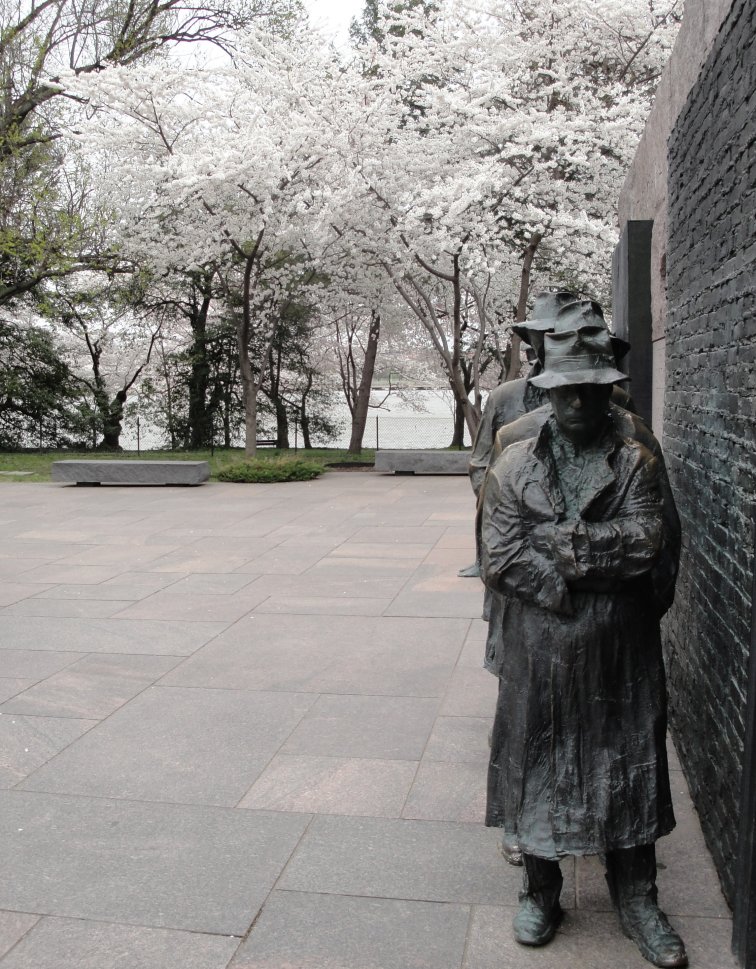I don’t make a fetish of equality. In fact, I usually value diversity over equality and believe a good system is one that provides opportunities for most people to live meaningful lives in line with their aspirations and talents. This is along the lines enabling the pursuit of happiness, not actually providing happiness or even significantly facilitating it. One reason we cannot advocate ”providing” happiness is that we don’t know what happiness is. Nor can we know, since each person defines it somewhat differently. One thing we do know is that happiness comes from believing your life has some meaning and a meaningful life is often not an easy one. Meaning in life comes from making choices and living with the consequences of them. If you cannot or do not make choices, you are an object and most people don’t want that, no matter how comfortable they might be.
So a good government is one that enables most people to make meaningful choices and create meaningful places for themselves in society. A good society enables most people just to be decent folks. I think we are slipping up on this.
What I don’t like is an increasing tournament mentality, maybe even a lottery mentality. This is a specific type of completion, which is unusually pernicious since it not only features a winner take all (or almost all) finish, but also tolerates or even encourages sabotage and subterfuge.
Competition usually carries with it the notions of winners and losers, but in a broad society base with continuous diverse, you can have different sets of winners based on different skill sets, luck or time. If you find that your skills are not particularly suited to one field, you might go into another. It is possible to have whole different sets of criteria. In a balanced life you will win some and lose some and in a reasonably open opportunity society you can benefit from the innovation and techniques of the winners even when you don’t yourself win. The challenge and response are important. The “final” outcome is less crucial because there is not final outcome. (While competition underlies all human societies (and all animal and plant species as per Darwin) we have modified out some of the more destructive aspects.)
A tournament competition is not like that. In a tournament you go directly against other competitors. Your goal need not to be better in general, you just have to be better than the competition. This is great for games and game shows (like American Idol) but it is hell in real life. Most of us don’t like to be on our game all the time and few of us really like head to head competition. But society is becoming more like a tournament all the time. If I am right that most people don’t want to be involved in a constant tournament, why are we in them more often?
One reason is that some people really DO like the tournament model and they can sometimes force this kind of competition on others. But there have always been such people. Why do the dominate at some times and not others?
IMO they are enabled by several conditions. The first is technological. It is possible for a person to cast a much longer shadow. There is a program out now about life on earth. Oprah Winfield narrates. Why is she narrating this program? Because she can. Oprah does almost everything. She is an actress, a narrator, an editor, a commentator, a talk show host, and she also is just very-very rich. Oprah has beat out the competition in so many areas because technology allows her to be virtually in many places at the same time. She has displaced hundreds or thousands of other narrators, commentators etc in a way that would have not been possible a century ago, when such things usually required actual physical presence and time spent.
The “March King” John Phillip Sousa opposed the rapid spread of phonographs. He feared it would hurt live-performances and virtually kill the “production” of music in the home and he was right. In days past it was common for family members to perform musical programs for guests and each other. Probably most of them were “bad,” but if you rarely heard a “good” one, it was okay. Today your poor little sister has to compete with the world’s best musicians available on recordings that sound even better than the live show. It is no wonder we have all retreated becoming passive listeners, each of us equipped with our own I-Pods. Most of us have lost the tournament, AND we know it.
This goes for arts & performances. It goes for business too and it has gone way beyond mass production. Goods have become more ethereal and sometimes contain almost no physical component. Software is like that. It can be duplicated at almost no cost and sold for significant profits. Beyond that, it true tournament fashion, one software system will come to dominate. There is a “market” for pirated copies of successful software, but there really is no market for a myriad of alternatives. Many people dream of knocking off and replacing Google, but nobody thinks there will be thousands of little locally produced Googles. In the tag line from “Highlander”, there can be only one.
Another driver of this tournament is globalization. This is not the first time the world has seen his. The first globalization I know much about came at the end of the Greek dark ages, around 700BC. Of course, I am using the globalization term generically to say that beginning around that time the Greek world encompassed THE world as far as they cared. There problems were remarkably similar to ours.
One of the biggest problems was growing inequality. Great inequality is impossible as long as you live in a poor, localized environment. There just is not enough total wealth nor the means to accumulate or preserve it. In other words, even if the king owns everything, there is not that much available to own and his capacity to use it is limited. A human can only physically consume so much and it is not possible for the richest guy to eat or drink much more than the poorest ones (presuming they eat enough to stay alive) and besides fat, you really cannot accumulate eating. Globalization brought in luxury goods and changed the equation. Suddenly eating goat meat and drinking goat milk was no longer enough.
What globalization provides is scale. The big fish can grow bigger in a bigger pond. You can see this in the modern world in languages. English the most widespread language in the world, so an author who writes in English can access hundreds of millions of readers with not much variable cost. (More than half the world’s technical and scientific publications are in English, not because they are all written by native English speakers, but because it is the international language. If a Japanese scientist wants to communicate with a German scientist, he does it in English.) An author writing in a language like Norwegian is just out of luck. Even if he becomes “world famous” in Norway, he probably cannot sell more than a half a million copies of his book. The market is just too small. It is just not possible for a writer in Norwegian to become a mega-best seller. But if he taps into the global market, it is possible. That is one reason why so many people write in English. There is a significant network effect. But globalization also leads to the tournament effect.
I don’t think there is much we can do about those things I mentioned above. The ancient Greeks wrested with the problem. There was the example of the Spartans, who successfully localized themselves and kept the changes at bay for a couple of centuries, but while we can admire Spartan martial spirit and vigor, I don’t think we want to pay the price they did. We have to live with a world where Oprah can take the place of thousands of us. But there are things that are within our control.
Most of us are never going to do anything great and almost none of us will be famous for being great because greatness is a zero sum game. Technology and science can give us more stuff, but it cannot give us more greatness in the famous sense. There can be only a limited number of famous people. It is the nature of being famous that the club is very exclusive.
We can go back to the concept of “decent folks.” Being decent doesn’t imply anything extraordinary. It is possible for almost everybody to achieve “decent” status. And you don’t have to be famous, but you do have to have some standards and that requires some “judging.”
I think we have abandoned or even tried to destroy the idea of decency because we have been loath to judge those who didn’t live up to it and we have fallen into the perfection trap. A decent person is not a perfect person. I consider myself a decent person, yet I know I have done or sometimes failed to do some of the decent things. When I realized my error, I sometimes tried to make up for them, but I didn’t always succeed. Nevertheless, on balance I am decent.
Am I hypocritical? Sometimes I am. But I like it that we have hypocrisy. Hypocrisy is the tribute that vice plays to virtue and being hypocritical implies that we do indeed have a standard that many of us do not attain, but believe is valuable.
If you apply a standard of decency to fallible humans, you will indeed have some hypocrisy. But consider the alternatives. Do we want the kind of world where a man can cheat on his wife while she is fighting cancer, lie about fathering a child, treat everybody he knows poorly AND not feel he should be ashamed to let people find out about all of this?
BTW – there is a hilarious South Park episode that addresses this kind of thing.
Most people can do the decent thing most of the time. AND most people know what that is most of the time, although there will be some variation among individuals and groups.
I think that happiness comes from self respect – not this self esteem thing we try to “build” among people who might not otherwise have earned it – and self respect comes from having choices and making the decent choices most of the time. Many of those star athletes and wacky celebrities we so often see on their way to detox or apologizing for their latest escapade are rich in self esteem, but lacking totally in self respect. The decent choice is the one you feel good about, even if other people don’t praise you for it. It often means doing the right thing that is hard, rather than the pleasurable thing that you can excuse later.
Unearned success is spiritually corrupting. Who among us would want to be Paris Hilton if you had to BE Paris Hilton in all her goofy glory? When people look back on the good times in their lives, they almost never reminisce about the fat times when somebody gave them something for nothing. It is rather the challenges met and mastered that make us happy. The actual rewards of the accomplishments are often secondary to the choices made. Happiness is earned, not given.
Few of us can be famous and most of us cannot be rich, but all of us have the choice to be decent folks … or not. All of us can pursue happiness and lots of us can catch it. But nobody else can do it for us.










